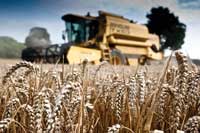Vote to feed the world and win a trip to South Africa 2010

How are we going to feed the world? It’s the most important question of the 21st century, dominating discussions at world-leader summits. It concerns everyone from the wealthiest business tycoons to the starving, living in the poorest shanty towns.
But no one has made a concerted effort to ask the world’s farmers – the very people who are tasked with providing the solution.
That’s why Farmers Weekly, the UK’s best-selling farming title, is initiating farming’s most wide-reaching poll. We’ve teamed up with six of the world’s leading farming titles.
In one of the most ambitious online projects the global agricultural community has ever seen, we’re asking almost a million progressive farmers around the world to take part in our poll and air their views on solutions to feeding the world.
Taking part is easy – go to www.fwi.co.uk/globalpoll. There you will find five key factors that will be instrumental in how we nourish a growing population. Just indicate which one you think is the most important. They are:
1. Removal of trade barriers
2. Government intervention in food production
3. Investment in research and development
4. Uptake of new technologies and genetic modification
5. Broader expertise, through education and training
Farmers Weekly is also running a forum where you can contribute further to the debate.
So what are farmers’ views on the big issues? A Dutch dairy farmer would have a very different stance on access to global markets from a wheat grower in Western Australia. Perhaps biofuels and GM crops offer most to a Mid-West corn grower. And where in the world will be the climate change winners?
Few are better placed to comment on farmers’ concerns and aspirations than the editors of the world’s leading farming publications.
United Kingdom

The growing demand for food around the world has put UK agricultural production back at the heart of the economy and political thinking.
“For more than a generation, the output of British farmers has almost been taken for granted by consumers and politicians alike,” says Jane King, editor of Farmers Weekly. Now, she says, the scene is changing.
“UK policy is about producing as much food as possible in a sustainable way for the environment. We have first-class producers who can rise to the global challenge – we should see ourselves as part of the solution to feeding the planet.”
The UK can also make a contribution to feeding the world as a thought leader, and is likely to continue to deliver quality and add value and new thinking, she adds.
United States

Being a global food producer is what being a farmer is all about in the USA.
“It’s as analogous as fourth of July or flying the stars and stripes for a US farmer,” says Dan Looker, business editor of Successful Farming, the nation’s largest circulation farming publication.
The country is the breadbasket of the world. Its relatively consistent supply of wheat, soya beans and corn largely set the pace of world markets. There are 100m head of cattle and GM technology is mainstream.
But $5bn a year in direct farm subsidies is proving unpopular to some farmers. “The Senate doesn’t like them, but they survive and additional subsidies have been introduced.”
Meanwhile, initial enthusiasm for biofuels has decidedly waned. “There’s a backlash from various interests against the biodiesel and bioethanol speculative bubble. Farmers are still very supportive.”
The nation’s cattle farmers are under pressure from the Carbon Cap-and-Trade Bill that sets limits on carbon emissions.
South Africa

The views of South African farmers are shaped by the varied climate they deal with.
“Nowhere in the world do you get so many different climate zones in such a small area, and it gives the farmers a very diverse outlook,” notes Chris Burgess, editor of South Africa Farmers Weekly, the country’s premier English-speaking farming magazine.
Grain production is for the domestic market, or tends to travel no further than near-African neighbours. The country is also a net red-meat importer. But fruit and wine make South Africa a net exporter of agricultural produce, with the UK still its biggest trading partner. “One of the biggest problems is that farmers compete with highly subsidised imports, so they are very much in favour of removing trade barriers.”
The government has largely shunned biofuels, saying it is not feasible to use food crops for fuel.
Australia

Few nations feel more exposed to the threat of climate change than Australia.
“The farming community, which has been in drought for more than a decade, knows it will be the first hit by climate change,” says Ed Gannon, editor of the country’s biggest rural paper The Weekly Times.
A net exporter of agricultural commodities, much of Australia’s wheat is grown in New South Wales, Victoria and Western Australia. Dairy is concentrated in Victoria and Tasmania, while the big cattle stations are found in northern Australia.
The touchstone issues, beside the climate, are the availability of water, cheap imported food (particularly from China), free trade, increasing government regulation, the rise of the animal welfare lobby and the pressure on farming from urban growth.
New Zealand

New Zealand farmers are the most outward-looking in the world. The country has a huge agricultural output that dwarfs the domestic needs of its 4m inhabitants. An eye-opening 96% of its dairy output is exported.
“New Zealand is the protein factory to the world, and farmers take a level of comfort in that fact,” claims Tim Fulton, editor of New Zealand Farmers Weekly, the country’s leading farming publication. “Talk over here is dominated by how the industry can capitalise on it.”
The nation’s key strength and envy of the world is its grass-fed production system, supplying lamb and dairy products to European and US markets, among many others.
But farming accounts for around 50% of total greenhouse gas emissions and there’s talk of making the industry pay. “Farmers feel unfairly targeted in the climate change debate – dairy in particular has a job defending itself.”
The Netherlands

Dutch farmers are masters of producing staggering amounts of food in a relatively small area, and are gearing up to supply more to a hungry world.
“Farmers here are very proud of the fact that they produce so much from a small country,” notes Rochus Kingmans, editor of the country’s leading farming publication, Boerderij. “And they can do more – they have mastered a more intensive way of farming because they have a history of doing so.”
Meat and dairy are two areas in particular where the Dutch see opportunities. “When quotas are abolished in 2015, milk production could easily be stepped up by 20-30%. In the pig and poultry sectors there is talk of mega-farms with up to 300,000 chickens.”
The Netherlands has also learned how to balance this intensive form of farming with the needs of society. “In Holland we believe there is always a technical solution to any problem. Intensification is not necessarily the only solution, but it will be part of it.”
Canada

Given the size of the country you’d expect Canadian growers to be relishing the prospect of raising production to meet rising global demand. But their focus is on value, not volume.
“Much of our wheat-growing area is the furthest away in the world from tidewater,” says John Morriss, editorial director of Country Guide, Canada’s largest national farming magazine. “That makes transport a challenge, so our growers aim for high-value markets.”
More than 80% of its wheat and half the canola (rapeseed) is exported. The country’s deep, long winters and short, relatively dry growing season favour the high quality, high protein wheat that’s sought after by millers the world over.
But Canadian farmers feel vulnerable to the effects of climate change. “In the past we have seen prolonged droughts in the semi-arid West – our main wheat-growing area. A longer growing season could help yields but if that also meant less rainfall, yields could suffer.”
